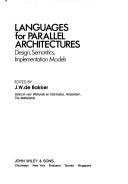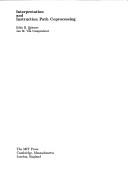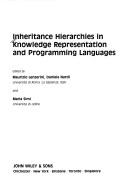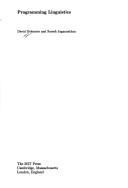| Listing 1 - 10 of 12 | << page >> |
Sort by
|
Book
ISBN: 0201184834 Year: 1988 Volume: vol *23 Publisher: Wokingham : Addison-Wesley,
Abstract | Keywords | Export | Availability | Bookmark
 Loading...
Loading...Choose an application
- Reference Manager
- EndNote
- RefWorks (Direct export to RefWorks)
Book
ISBN: 9072505042 Year: 1989 Publisher: Geel Cipal Institute
Abstract | Keywords | Export | Availability | Bookmark
 Loading...
Loading...Choose an application
- Reference Manager
- EndNote
- RefWorks (Direct export to RefWorks)
Programming --- Langages de programmation (Ordinateurs) --- Logiciels --- Programmeertalen (Computers) --- Programming languages (Electronic computers) --- Software --- 681.33 --- Programmering --- programmeertaal --- Publieke sector

ISBN: 0471921777 9780471921776 Year: 1989 Volume: vol *6 Publisher: Chichester New York Singapore Wiley
Abstract | Keywords | Export | Availability | Bookmark
 Loading...
Loading...Choose an application
- Reference Manager
- EndNote
- RefWorks (Direct export to RefWorks)
Computer architecture --- Computerarchitectuur --- Langages de programmation (Ordinateurs) --- Ordinateurs--Architecture --- Parallel programming (Computer science) --- Parallelle programmering (Informatica) --- Programmation parallèle (Informatique) --- Programmeertalen (Computers) --- Programming languages (Electronic computers) --- Langages de programmation --- Ordinateurs --- Architecture --- Computer architecture. --- Programming languages (Electronic computers). --- Parallel programming (Computer science). --- Programmation parallèle (Informatique) --- Petri Net --- Specification --- Functional Language --- Object Oriented --- Programming

ISBN: 0262041073 Year: 1990 Volume: vol *5 Publisher: Cambridge, MA : M.I.T. Press,
Abstract | Keywords | Export | Availability | Bookmark
 Loading...
Loading...Choose an application
- Reference Manager
- EndNote
- RefWorks (Direct export to RefWorks)
Computer architecture --- Computerarchitectuur --- Langages de programmation (Ordinateurs) --- Micro-ordinateurs --- Microcomputers --- Ordinateurs--Architecture --- P.C. --- P.C.'s --- Personal computers --- Programmeertalen (Computers) --- Programming languages (Electronic computers) --- 681.3*D3 --- Microprocessors. --- Computer architecture. --- Architecture, Computer --- Minicomputers --- Computer languages --- Computer program languages --- Computer programming languages --- Machine language --- Electronic data processing --- Languages, Artificial --- Programming languages --- Programming languages (Electronic computers). --- 681.3*D3 Programming languages --- Microprocessors

ISBN: 2866015428 9782866015428 Year: 1996 Publisher: Paris Hermes
Abstract | Keywords | Export | Availability | Bookmark
 Loading...
Loading...Choose an application
- Reference Manager
- EndNote
- RefWorks (Direct export to RefWorks)
Langages de programmation (Ordinateurs) --- Programmeertalen (Computers) --- Programming languages (Electronic computers) --- World Wide Web --- World Wide Web (Informatie-retrieval systeem) --- World Wide Web (Information retrieval system ) --- World Wide Web (Système de récupération des informations) --- Langages de balisage --- VRML (Langage de programmation) --- HTML (Langage de balisage) --- Java (Langage de programmation) --- Edition sur le Web.
Book
ISBN: 0070654166 Year: 1986 Publisher: New York London Toronto McGraw-Hill
Abstract | Keywords | Export | Availability | Bookmark
 Loading...
Loading...Choose an application
- Reference Manager
- EndNote
- RefWorks (Direct export to RefWorks)
519.68 --- Programming languages (Electronic computers) --- 681.3*D3 --- 800.92 --- 800.92 Informatietalen. Formele talen --- Informatietalen. Formele talen --- 681.3*D3 Programming languages --- Programming languages --- Computer languages --- Computer program languages --- Computer programming languages --- Machine language --- 519.68 Computer programming --- Computer programming --- Langages de programmation (Ordinateurs) --- Programmeertalen (Computers) --- Electronic data processing --- Languages, Artificial --- Langages de programmation

ISBN: 0471927414 9780471927419 Year: 1991 Publisher: Chichester New York Singapore Wiley
Abstract | Keywords | Export | Availability | Bookmark
 Loading...
Loading...Choose an application
- Reference Manager
- EndNote
- RefWorks (Direct export to RefWorks)
Artificial intelligence. Robotics. Simulation. Graphics --- Expert systems (Computer science) --- Expertsystemen (Informatica) --- Kennisrepresentatie (Informatietheorie) --- Knowledge representation (Information theory) --- Langages de programmation (Ordinateurs) --- Programmeertalen (Computers) --- Programming languages (Electronic computers) --- Représentation des connaissances (Théorie de l'information) --- Systèmes experts (Informatique) --- Programming languages (Electronic computers)) --- Computer languages --- Computer program languages --- Computer programming languages --- Machine language --- Electronic data processing --- Languages, Artificial --- Representation of knowledge (Information theory) --- Artificial intelligence --- Information theory --- Knowledge-based systems (Computer science) --- Systems, Expert (Computer science) --- Computer systems --- Soft computing
Book
ISBN: 9789463440233 9463440232 Year: 2017 Publisher: Leuven Acco
Abstract | Keywords | Export | Availability | Bookmark
 Loading...
Loading...Choose an application
- Reference Manager
- EndNote
- RefWorks (Direct export to RefWorks)
This book teaches you to write small programs to solve computational problems, i.e. problems for which we can compute a solution in a series of steps. The book first explains how to write computer programs in an iterative way. The program then uses iterative statements that execute the same sequence of instructions over and over again under slightly changing conditions. Hereafter, the book explains how to write recursive programs as an alternative for iterative programs. In a recursive program, a function to solve a problem invokes itself over and over again on simpler and simpler versions of the original problem. Recursive programs often lead to very concise implementations of complex algorithms. The book uses Python as its programming language. In teaching basic programming to thousands of students, we experienced that Python is particularly suited to introduce people to the art of programming. Python is a scripting language, which makes it extremely simple to experiment with small fragments of code. The book contains about a hundred experiments to get a good grip on the different concepts of the language. Contrary to mainstream languages such as Java and C#, Python is an untyped language. As a Python programmer, you do not have to specify the kind of information that you store in variables or that you pass to functions. Typed languages such as Java and C# are definitely more difficult to learn and to use. Moreover, the benefits you get from checking typed programs only really come to the fore in larger software systems. The book is not about Python. In fact, some of the more advanced concepts of the language are not even explained. Emphasis is on developing algorithms to solve computational problems and to implement them using mainstream concepts offered by all modern programming languages. In this way, you are able to switch to other programming languages to implement your algorithms. The book discusses the general technique of "divide and conquer" to manage the complexity of computer programs. This technique suggests to split complex functions into less complex functions, until you reach a stage in which the implementation is straightforward to work out. The book also explains more specific techniques such as backtracking and dynamic programming to solve more specific kinds of problems. The final part of the book introduces more advanced topics in writing small programs. It first of all discusses how to reason about the correctness and the efficiency of computer programs. The book ends with an introduction to functional programming and to object-oriented programming. Functional programming offers facilities to describe solutions rather than how to compute them. There is a definite tendency to extend mainstream languages with concepts for functional programming. Object-oriented programming offers more advanced concepts such as classes to structure larger software systems.
Programming --- programming [function] --- Langages de programmation (Ordinateurs) --- Programmeertalen (Computers) --- Programming languages (Electronic computers) --- 681.3*D32 --- 681.3*D32 language classifications: applicative languages; data-flow languages; design languages; extensible languages; macro and assembly languages; nonprocedural languages; specialized application and very high-level languages (Programminglanguages) --- language classifications: applicative languages; data-flow languages; design languages; extensible languages; macro and assembly languages; nonprocedural languages; specialized application and very high-level languages (Programminglanguages) --- Python (programmeertaal)

ISBN: 0262071274 Year: 1990 Publisher: Cambridge, MA : Massachusetts Institute of Technology (MIT),
Abstract | Keywords | Export | Availability | Bookmark
 Loading...
Loading...Choose an application
- Reference Manager
- EndNote
- RefWorks (Direct export to RefWorks)
Programming --- Mathematical linguistics --- Computational linguistics. --- Programming languages (Electronic computers). --- Algebraic linguistics --- Langages de programmation (Ordinateurs) --- Language and languages -- Statistical methods --- Linguistics -- Mathematical models --- Linguistics [Mathematical ] --- Linguistique -- Modèles mathématiques --- Linguistique et mathématiques --- Linguistique mathématique --- Mathematische taalwetenschap --- Mathématiques et linguistique --- Programmeertalen (Computers) --- Programming languages (Electronic computers) --- 681.3*J5 --- Computational linguistics --- 681.3*H31 --- 681.3*H31 Content analysis and indexing: abstracting methods; dictionaries; indexing methods; linguistic processing; thesauruses (Information storage and retrieval) --- Content analysis and indexing: abstracting methods; dictionaries; indexing methods; linguistic processing; thesauruses (Information storage and retrieval) --- Computer languages --- Computer program languages --- Computer programming languages --- Machine language --- Electronic data processing --- Languages, Artificial --- Automatic language processing --- Language and languages --- Language data processing --- Linguistics --- Natural language processing (Linguistics) --- Applied linguistics --- Cross-language information retrieval --- Multilingual computing --- Geesteswetenschappen (computertoepassingen) --- Data processing

ISBN: 3540613986 3540685227 Year: 1996 Volume: 1095 *135 Publisher: Berlin [etc.] : Springer-Verlag,
Abstract | Keywords | Export | Availability | Bookmark
 Loading...
Loading...Choose an application
- Reference Manager
- EndNote
- RefWorks (Direct export to RefWorks)
This monograph is the result of the cooperation of a mathematician working in universal algebra and geometry, and a computer scientist working in automated deduction, who succeeded in employing the theorem prover Otter for proving first order theorems from mathematics and then intensified their joint effort. Mathematicians will find many new results from equational logic, universal algebra, and algebraic geometry and benefit from the state-of-the-art outline of the capabilities of automated deduction techniques. Computer scientists will find a large and varied source of theorems and problems that will be useful in designing and evaluation automated theorem proving systems and strategies.
Equations [Theorie des ] --- Equations [Theory of ] --- Langages de programmation (Ordinateurs) --- Logic [Symbolic and mathematical ] --- Logica [Symbolische en wiskundige ] --- Logique symbolique et mathémathique --- Programmeertalen (Computers) --- Programming languages (Electronic computers) --- Vergelijkingentheorie --- Automatic theorem proving. --- Curves, Algebraic. --- Artificial intelligence. --- Computer science. --- Computer graphics. --- Logic, Symbolic and mathematical. --- Artificial Intelligence. --- Programming Languages, Compilers, Interpreters. --- Mathematics of Computing. --- Mathematical Logic and Formal Languages. --- Computer Graphics. --- Mathematical Logic and Foundations. --- Algebra of logic --- Logic, Universal --- Mathematical logic --- Symbolic and mathematical logic --- Symbolic logic --- Mathematics --- Algebra, Abstract --- Metamathematics --- Set theory --- Syllogism --- Automatic drafting --- Graphic data processing --- Graphics, Computer --- Computer art --- Graphic arts --- Electronic data processing --- Engineering graphics --- Image processing --- Informatics --- Science --- AI (Artificial intelligence) --- Artificial thinking --- Electronic brains --- Intellectronics --- Intelligence, Artificial --- Intelligent machines --- Machine intelligence --- Thinking, Artificial --- Bionics --- Cognitive science --- Digital computer simulation --- Logic machines --- Machine theory --- Self-organizing systems --- Simulation methods --- Fifth generation computers --- Neural computers --- Digital techniques
| Listing 1 - 10 of 12 | << page >> |
Sort by
|

 Search
Search Feedback
Feedback About
About Help
Help News
News